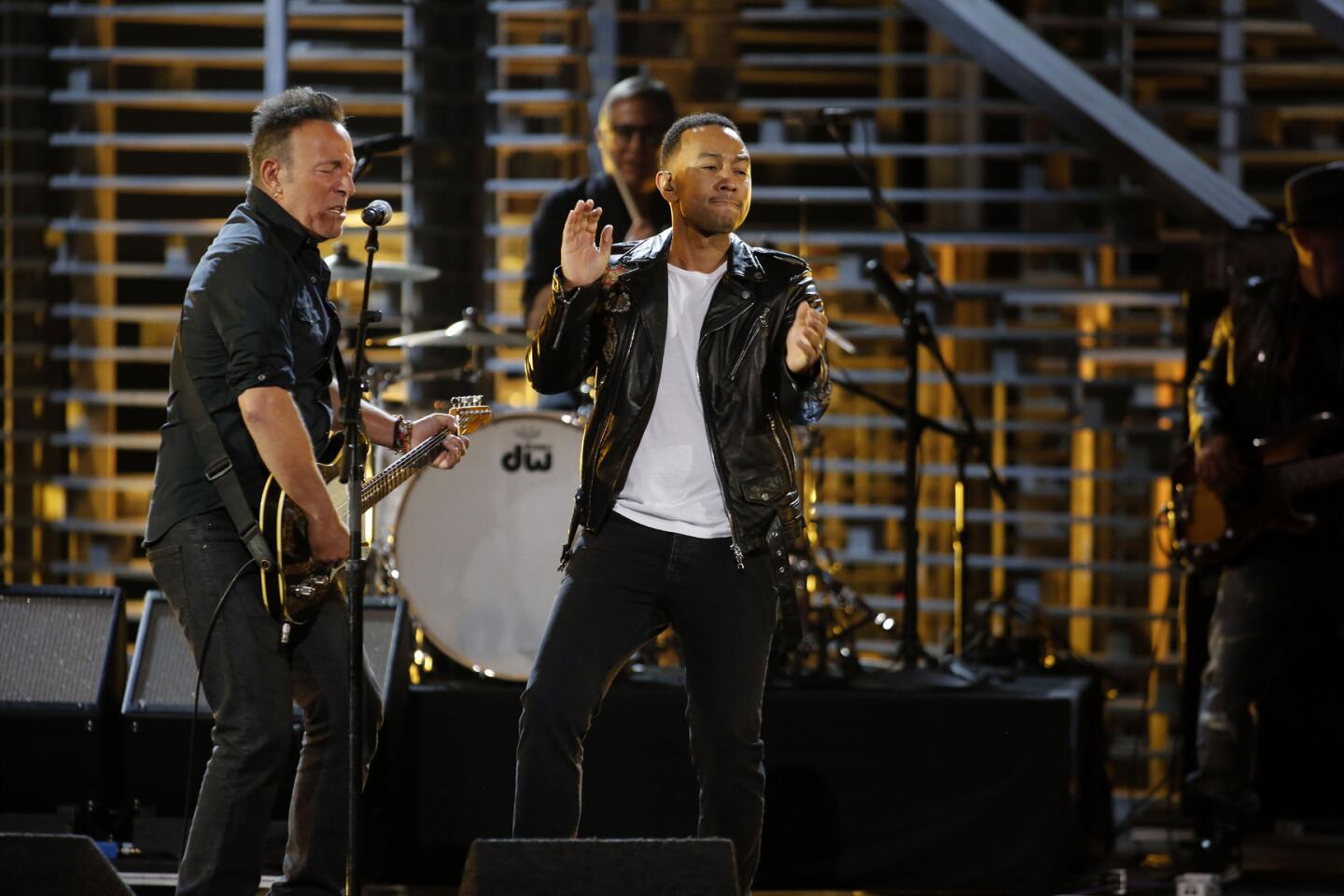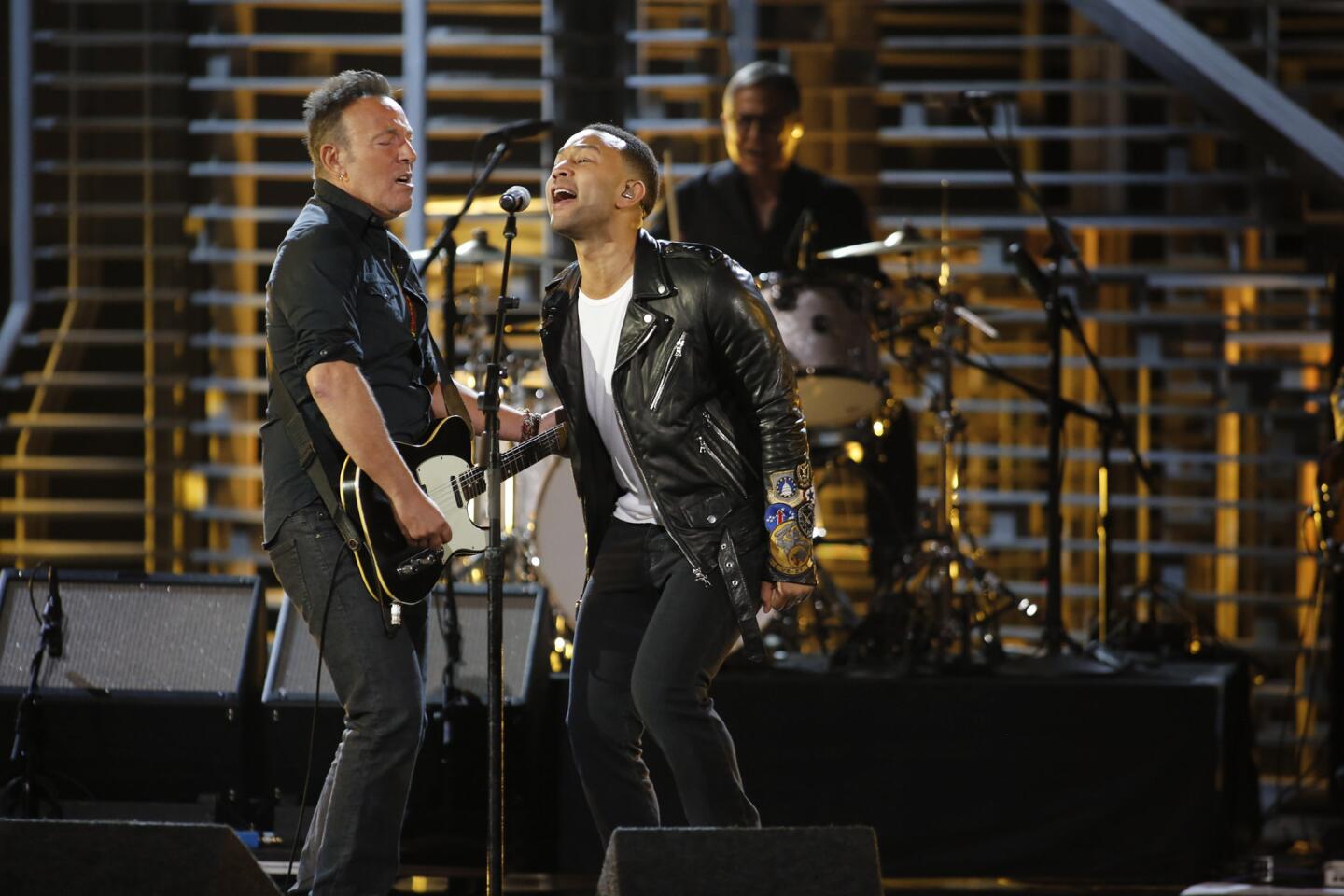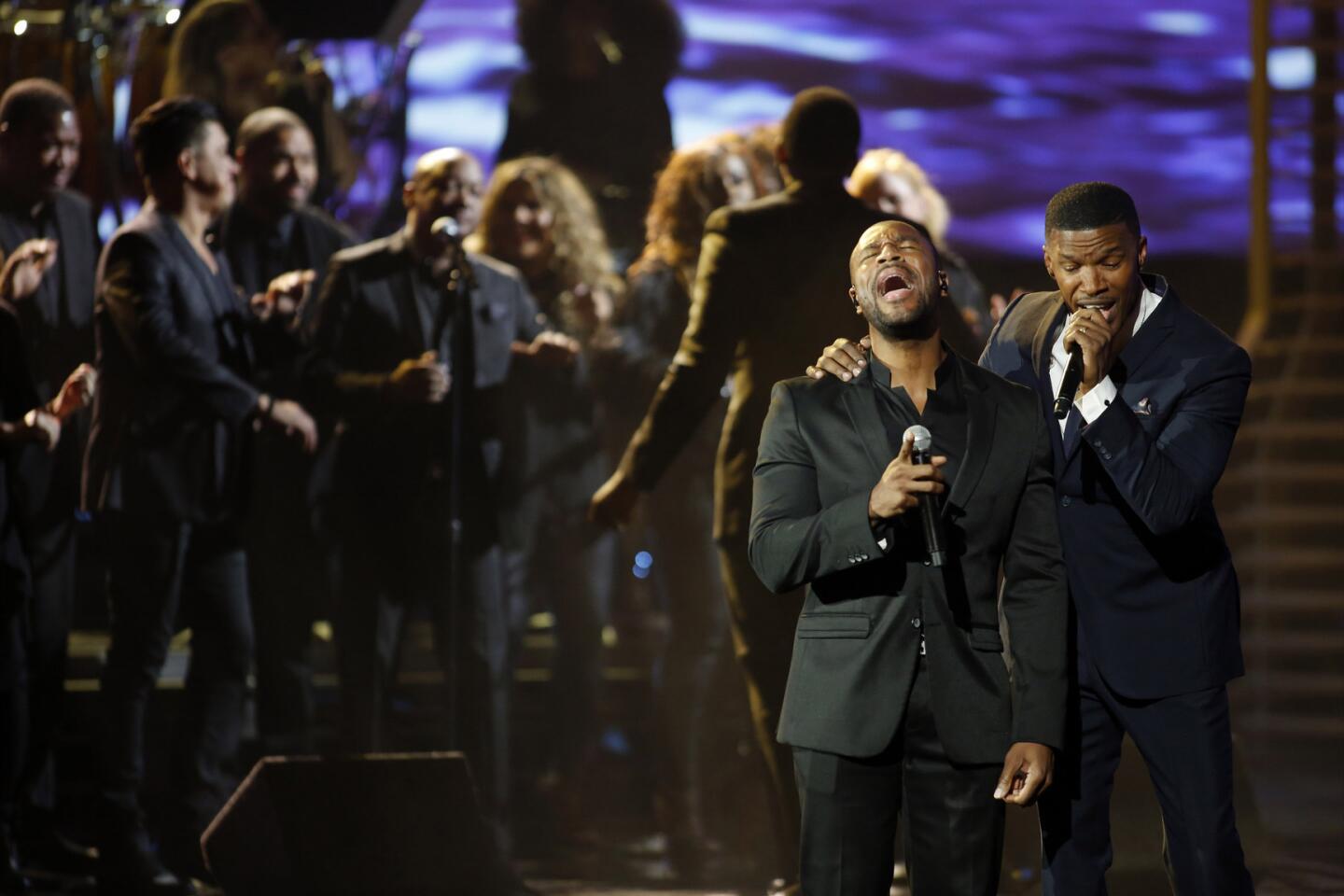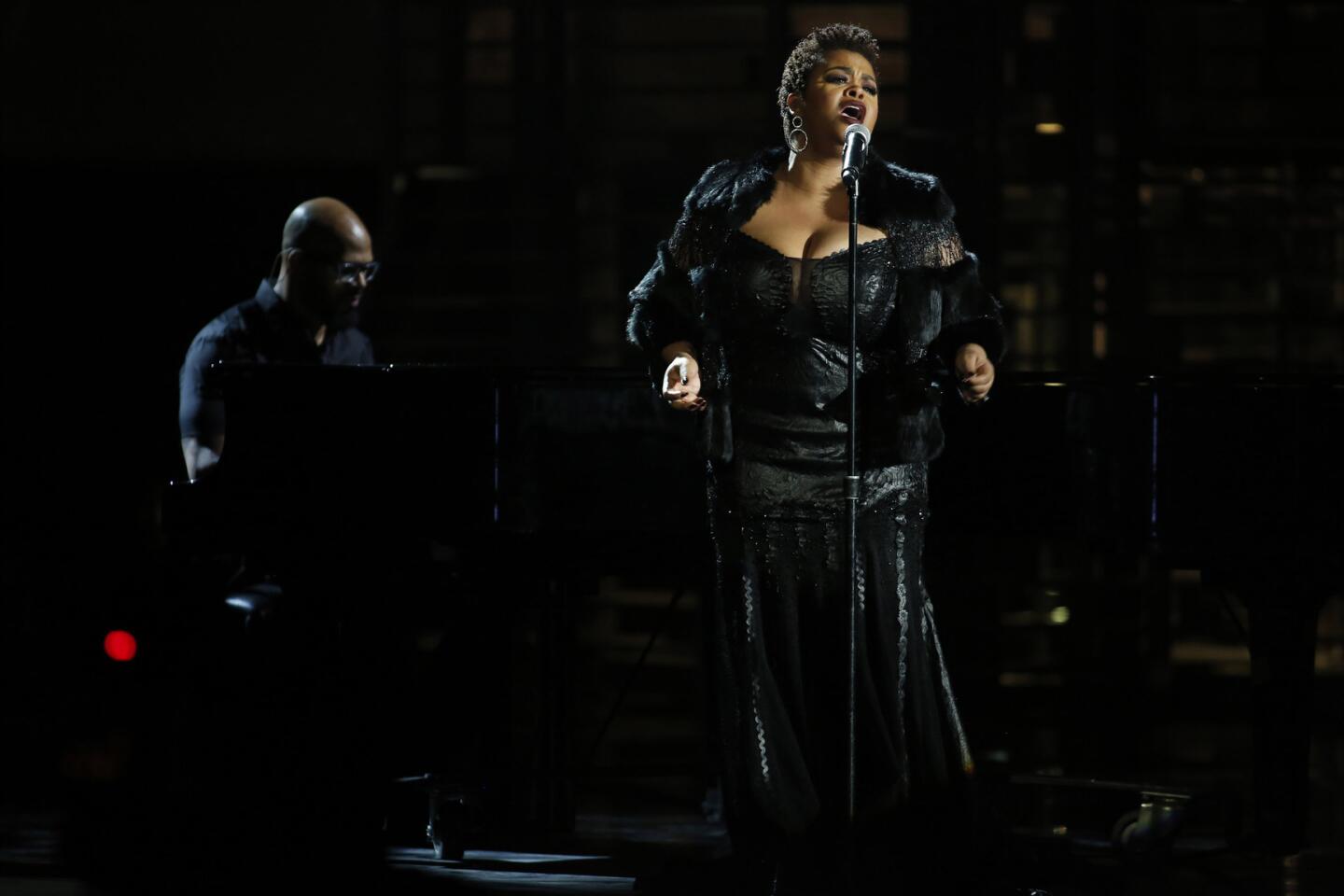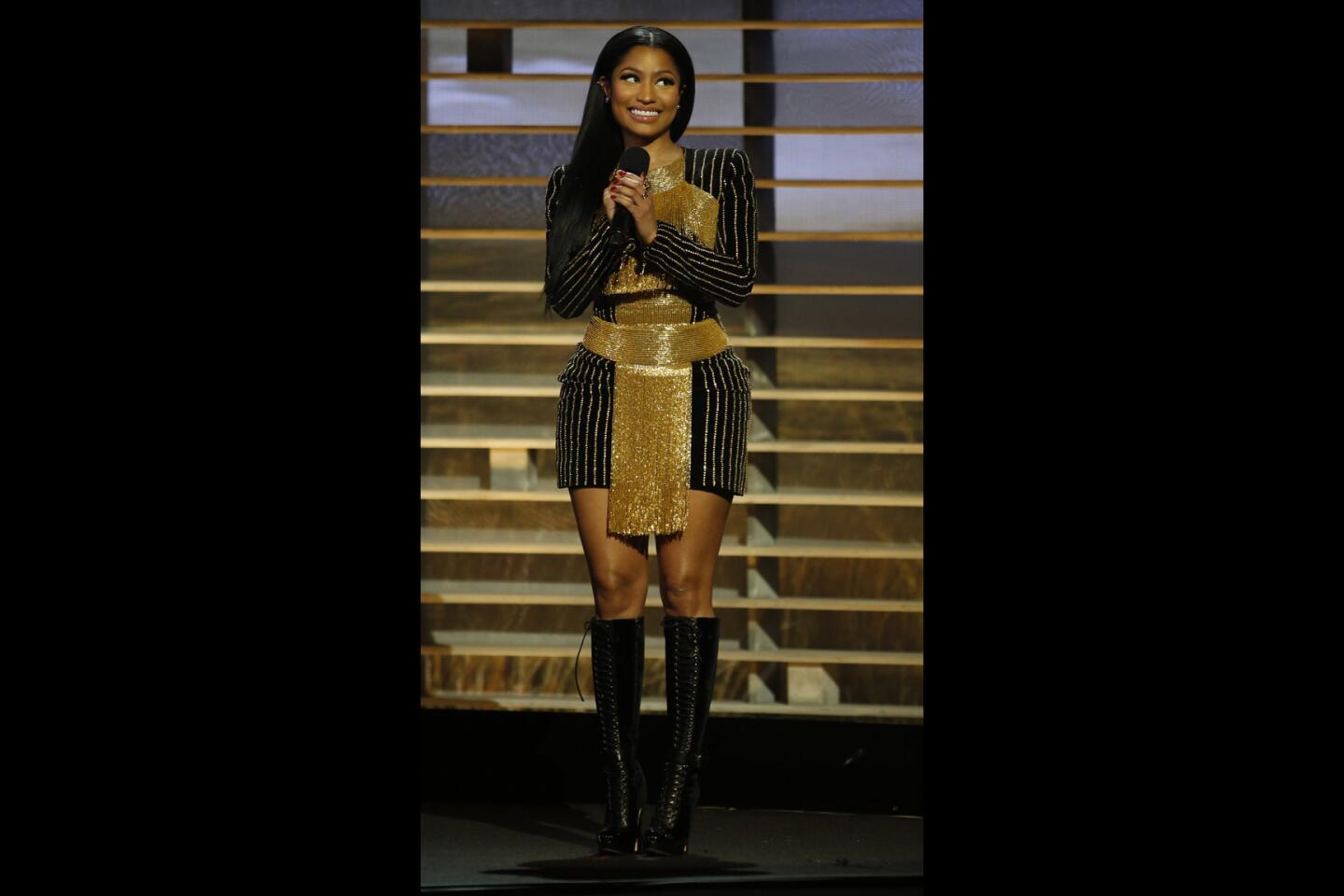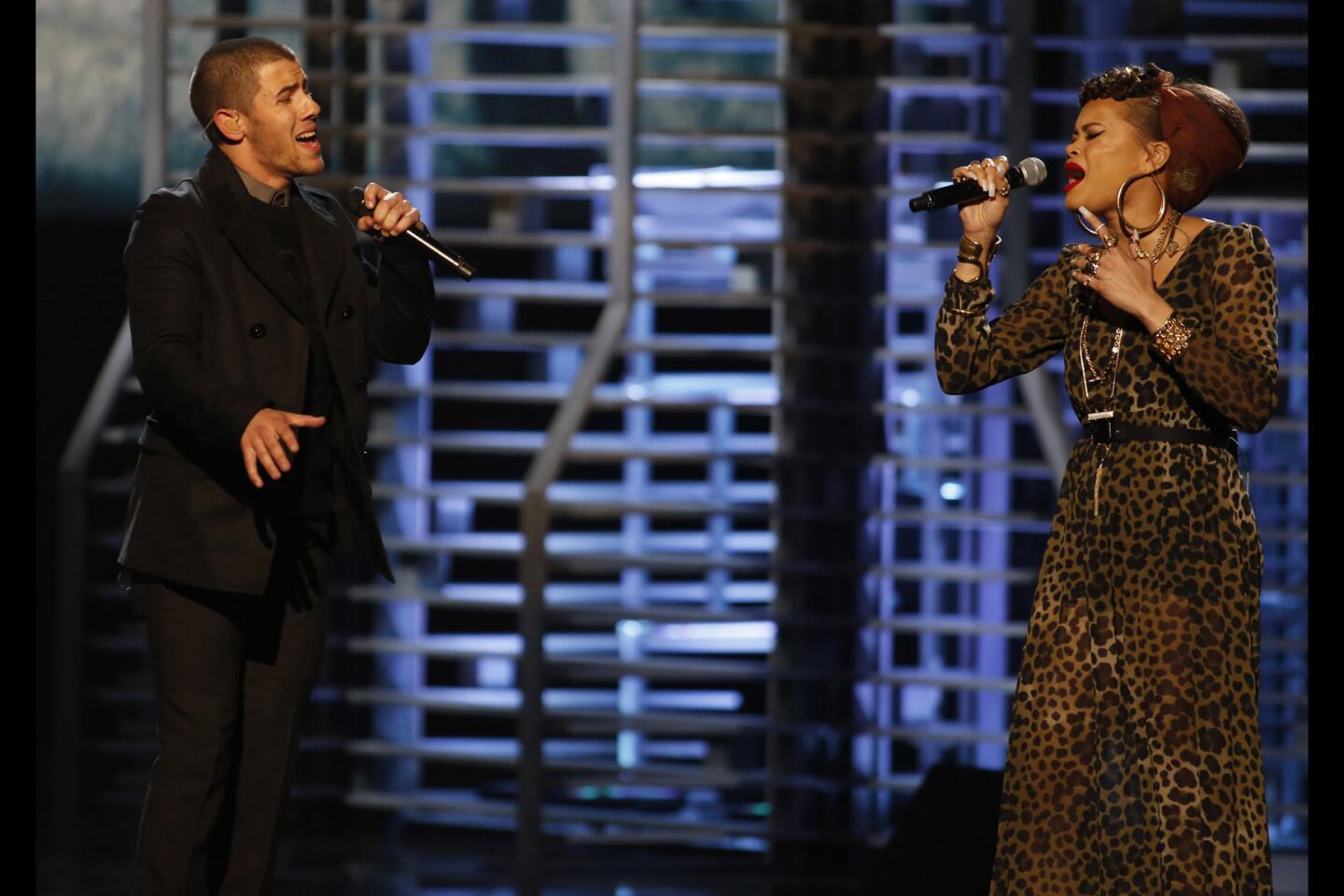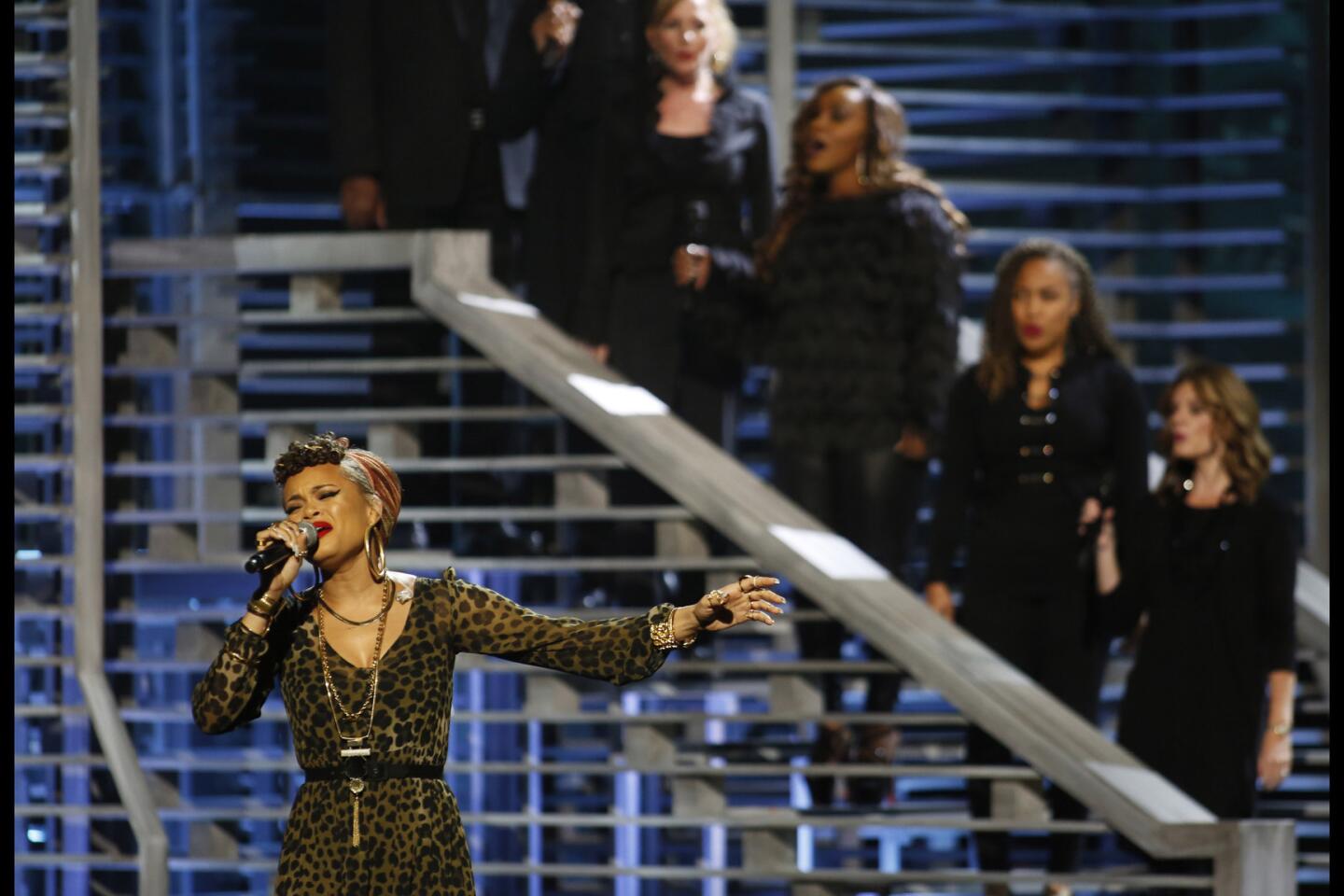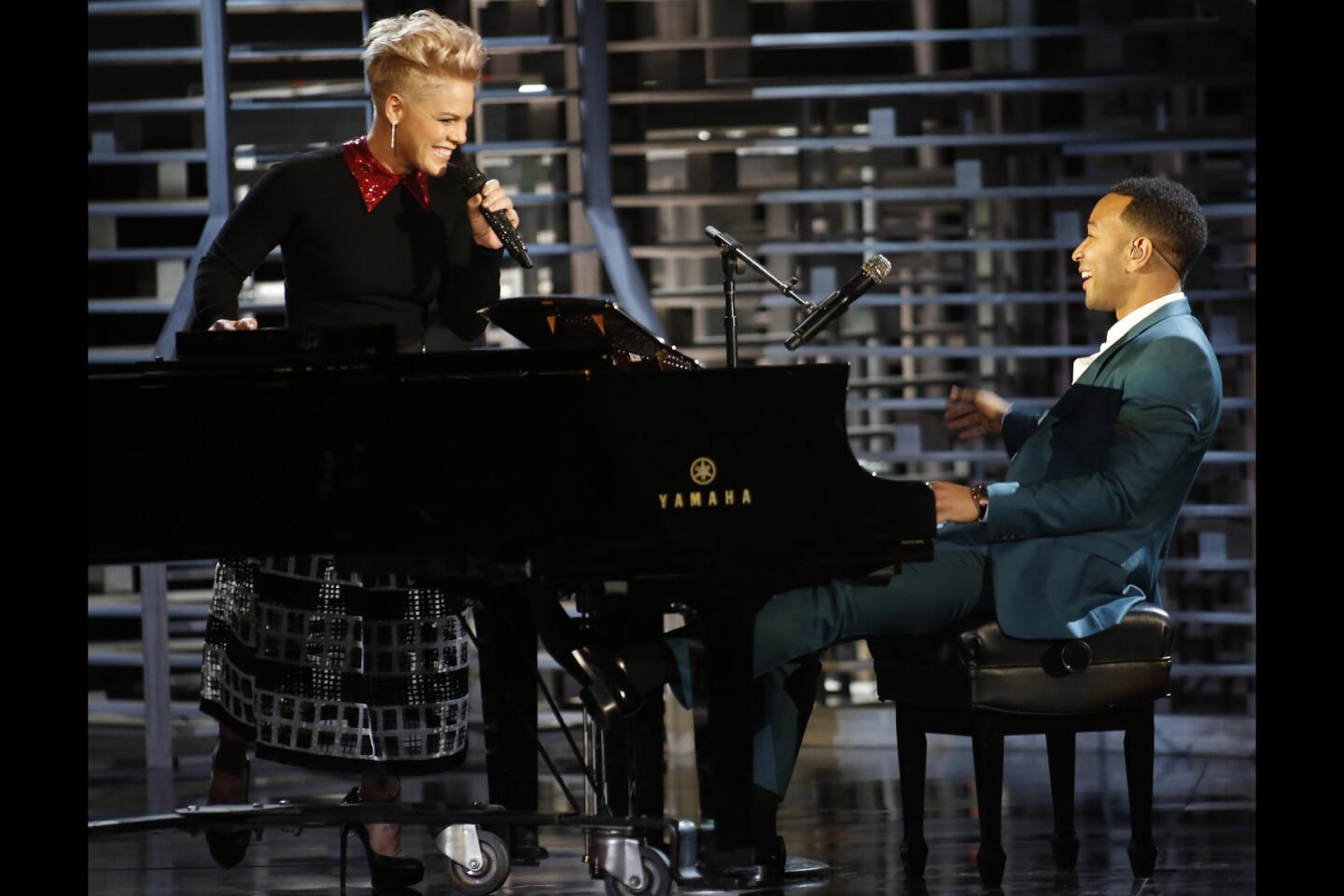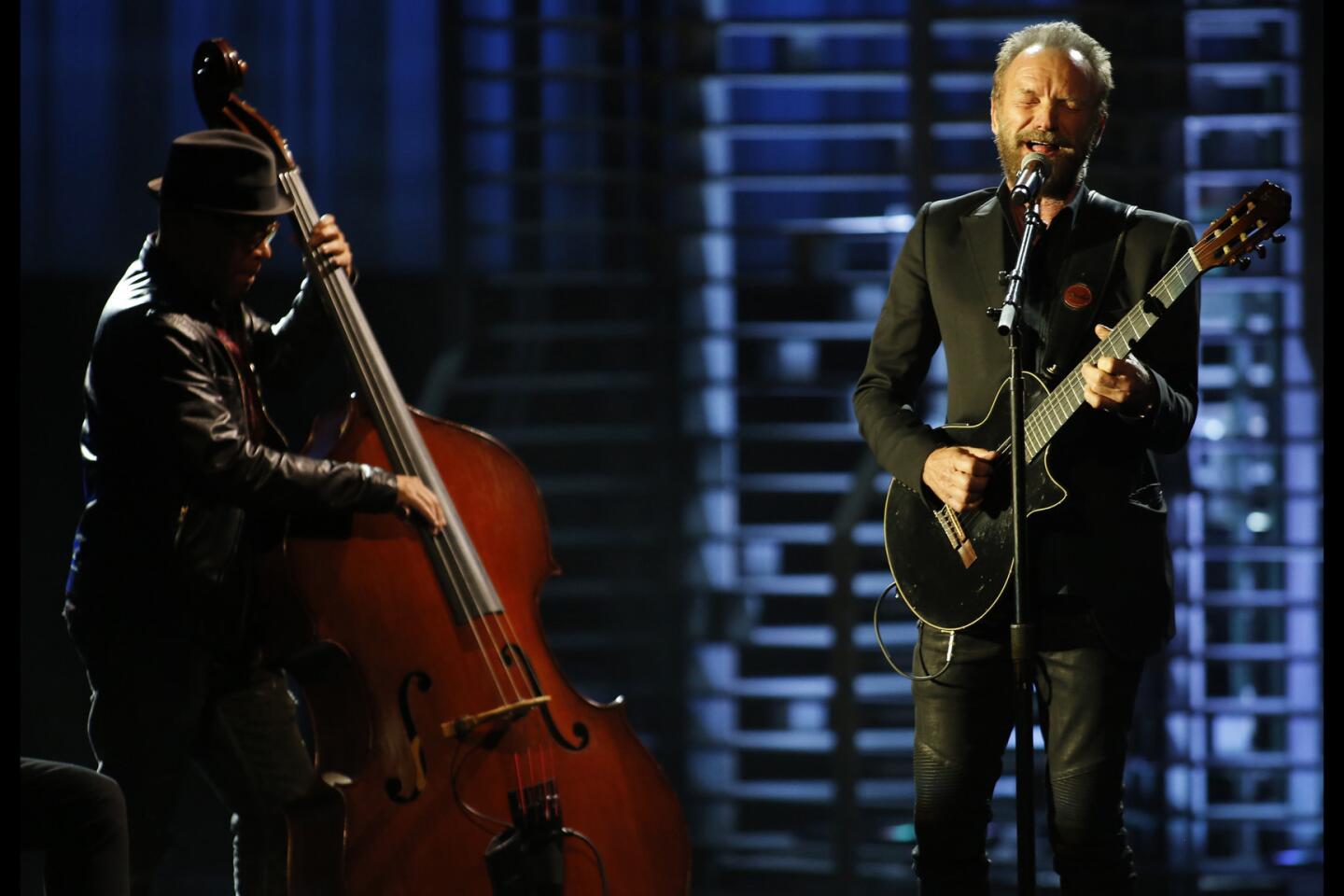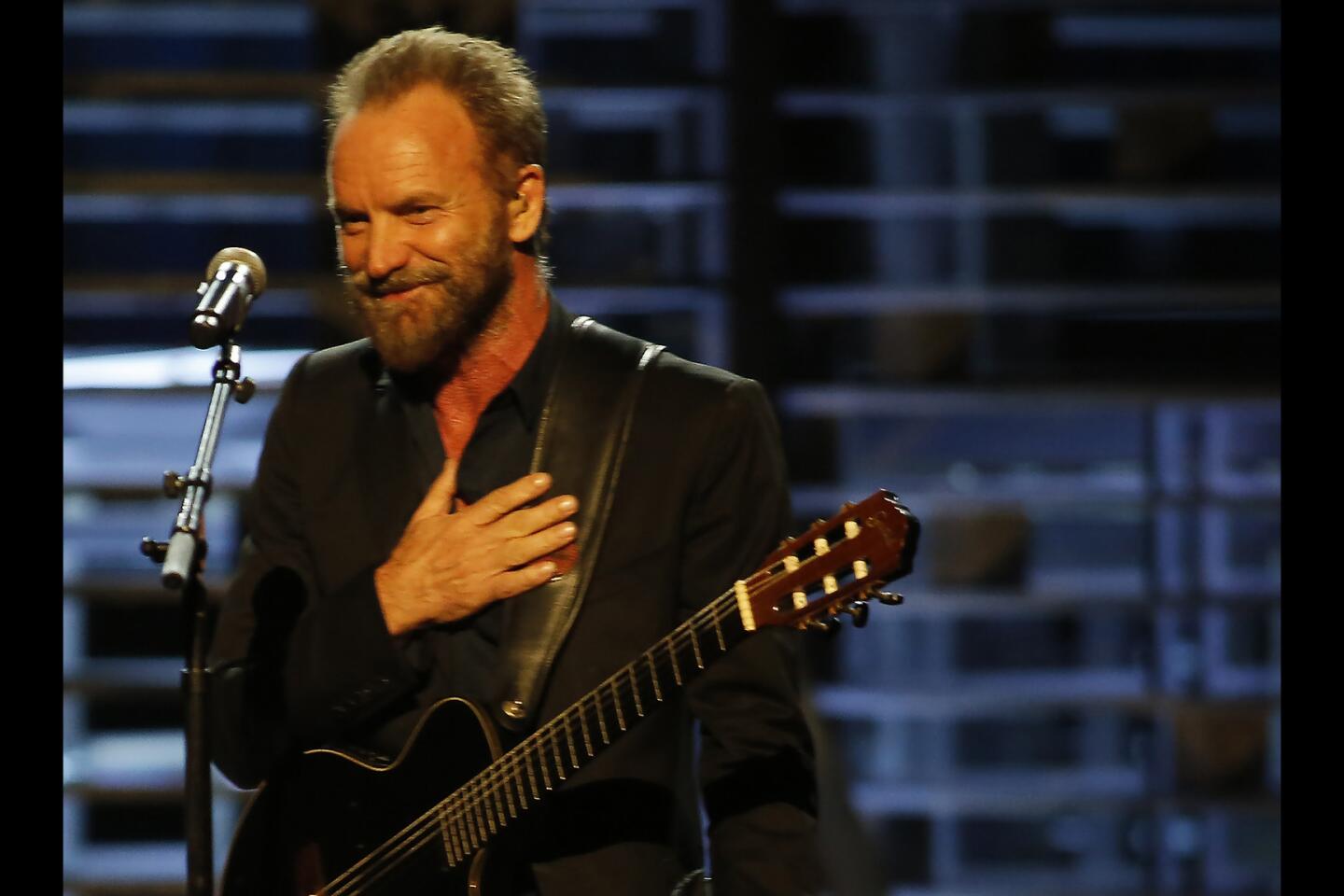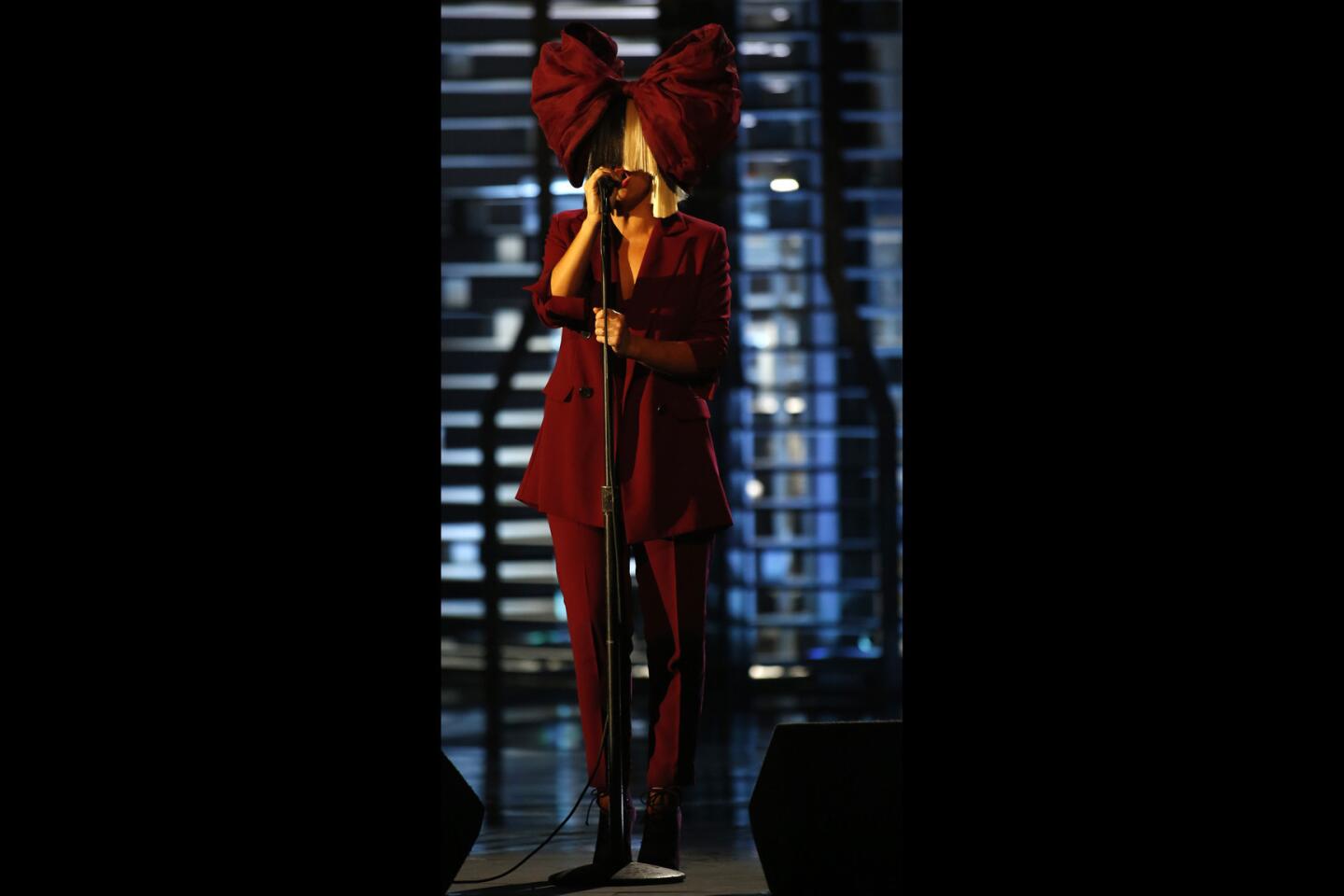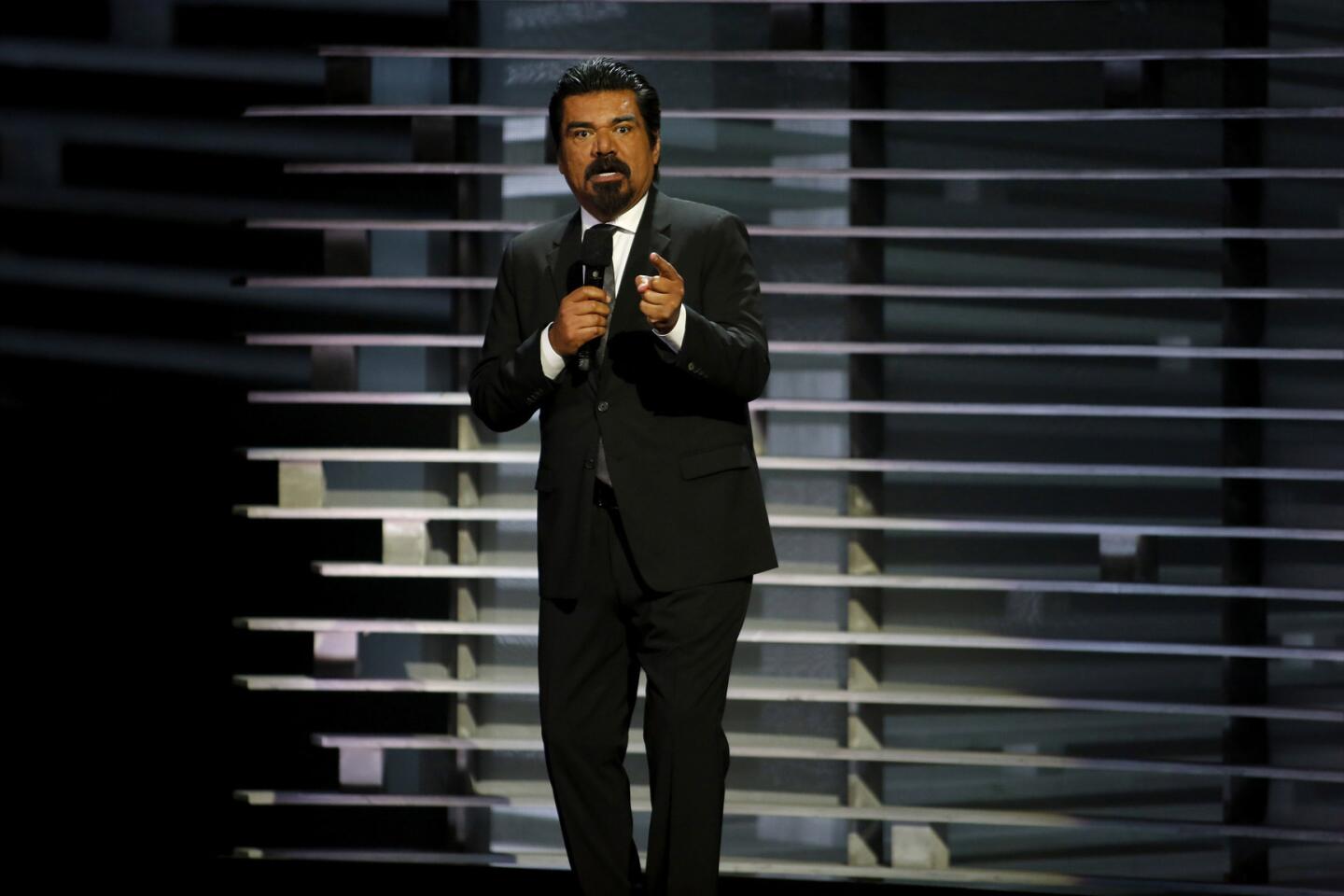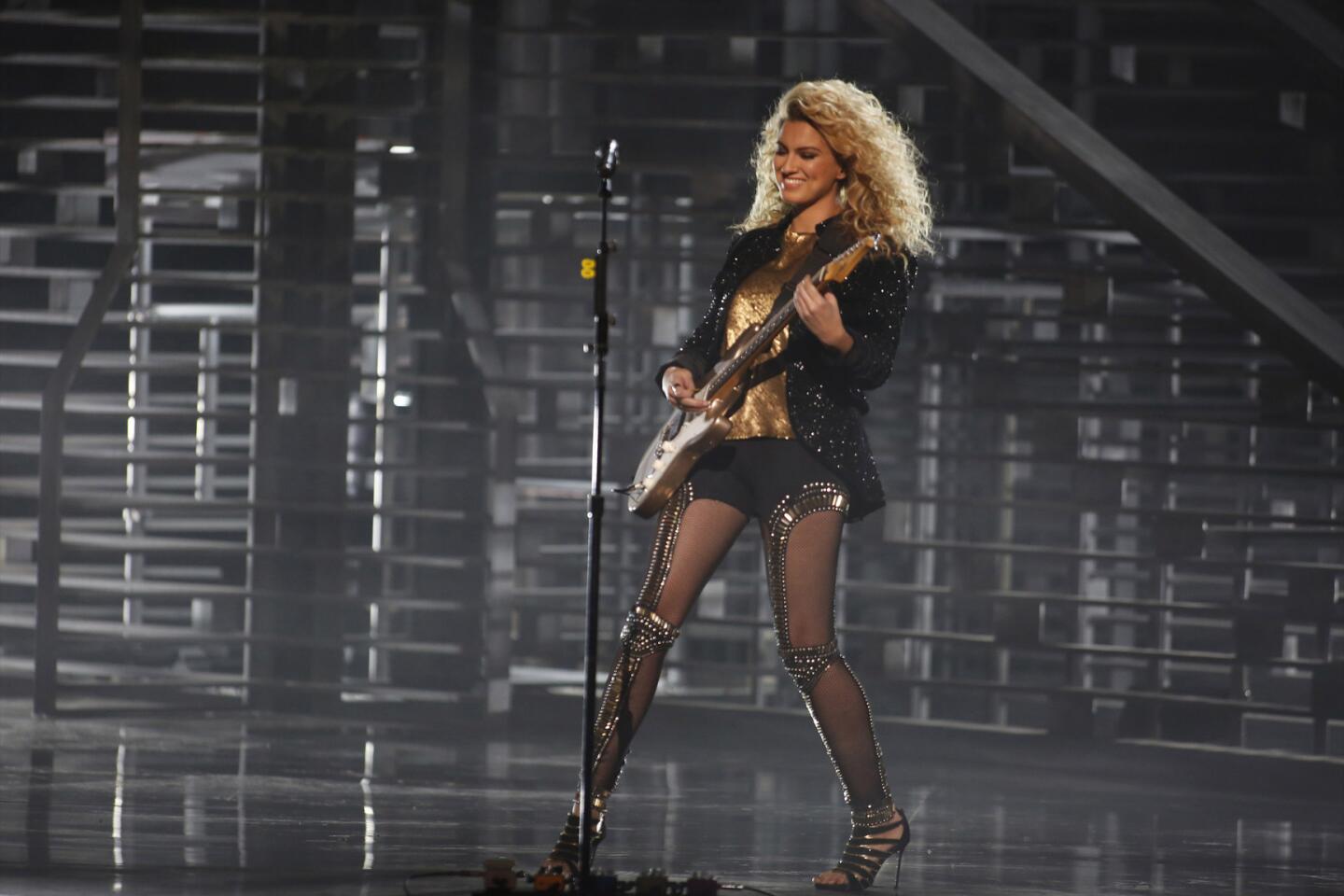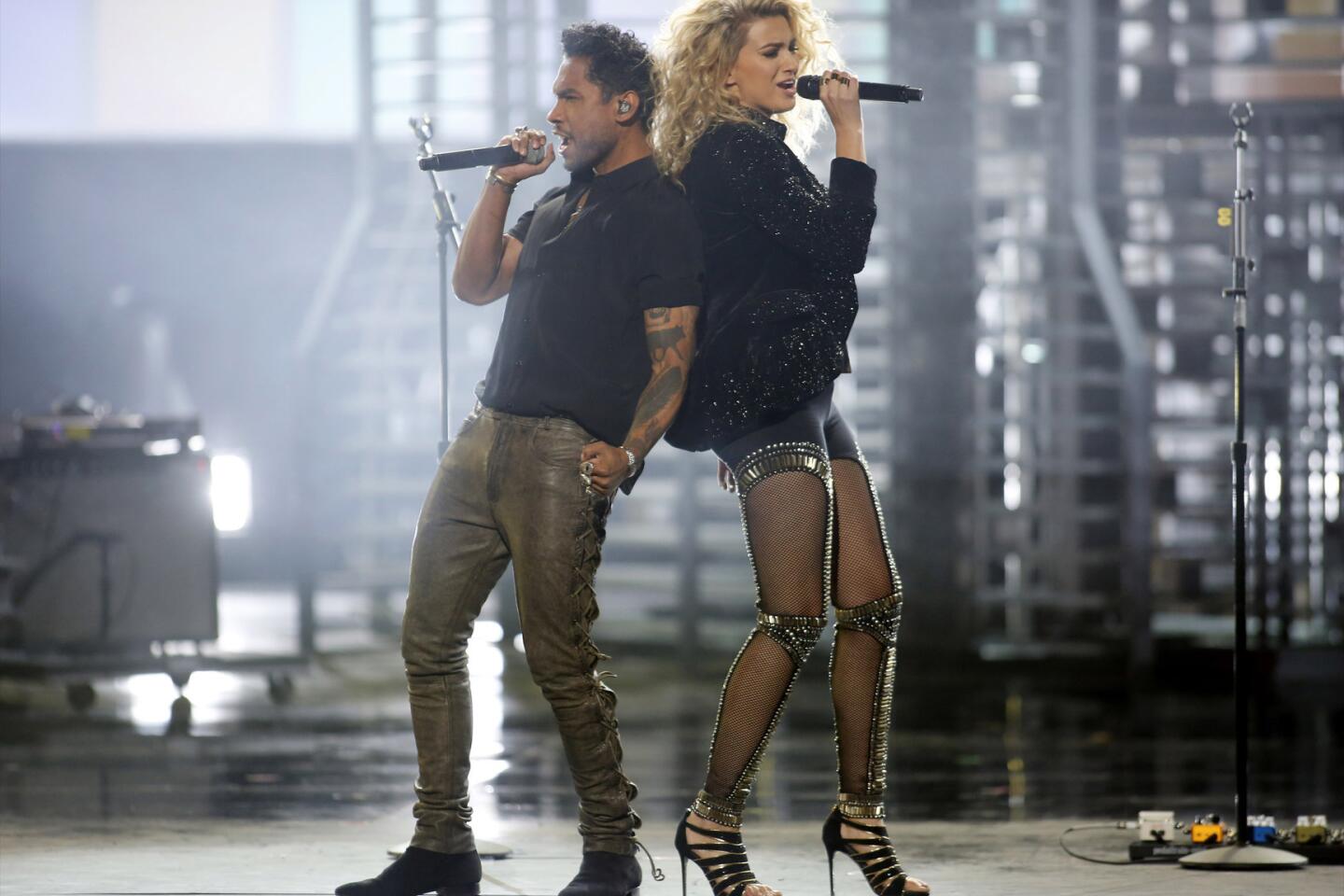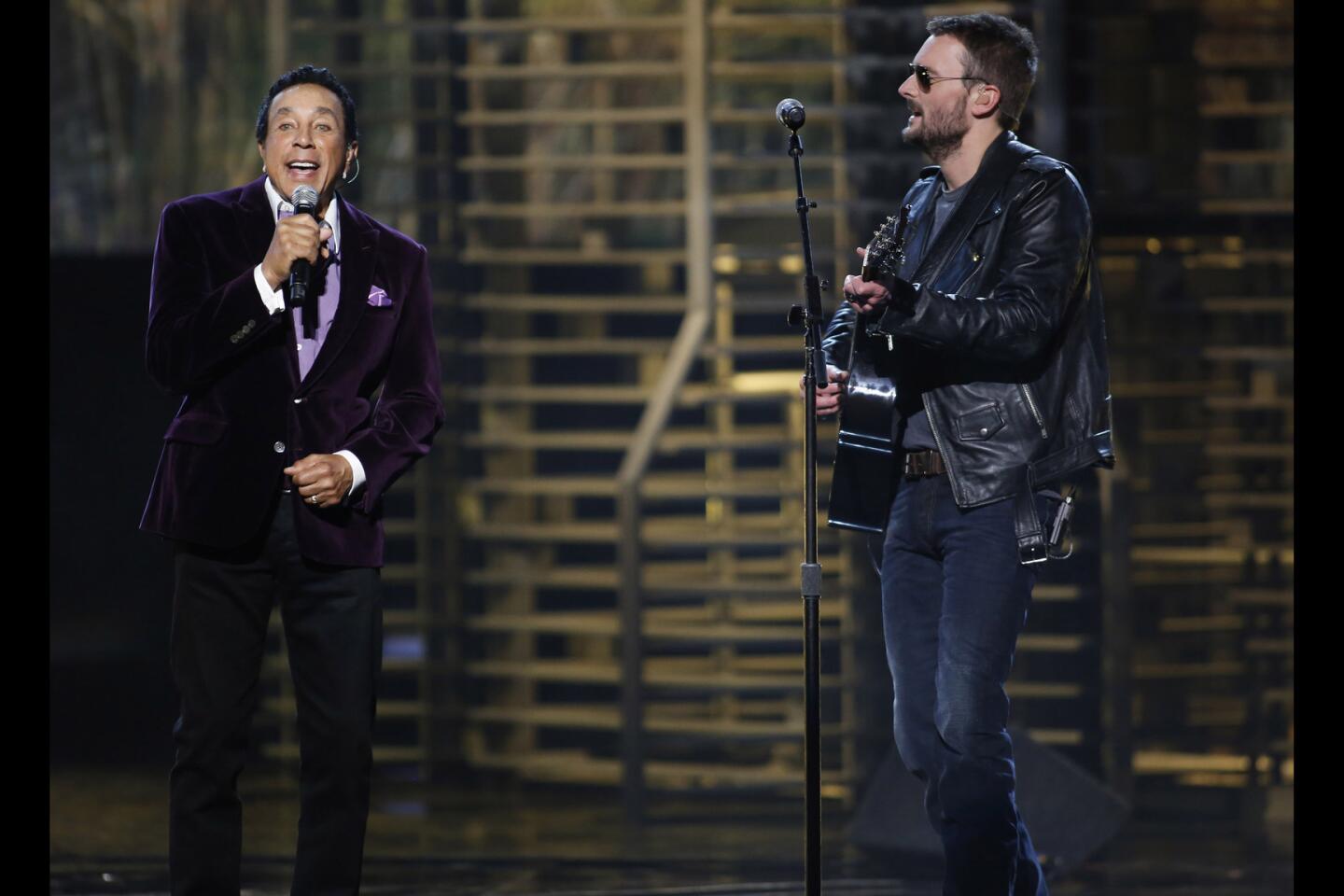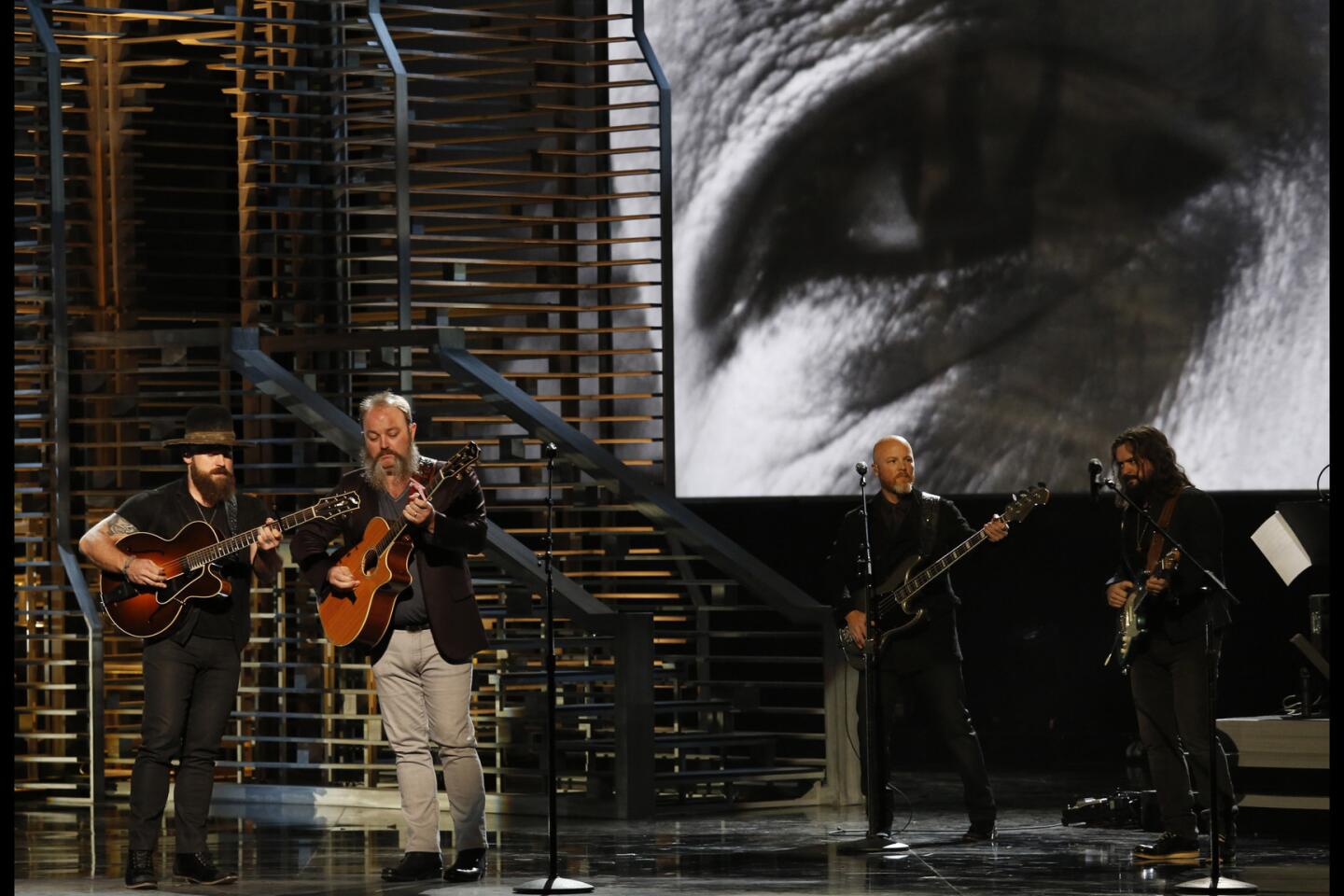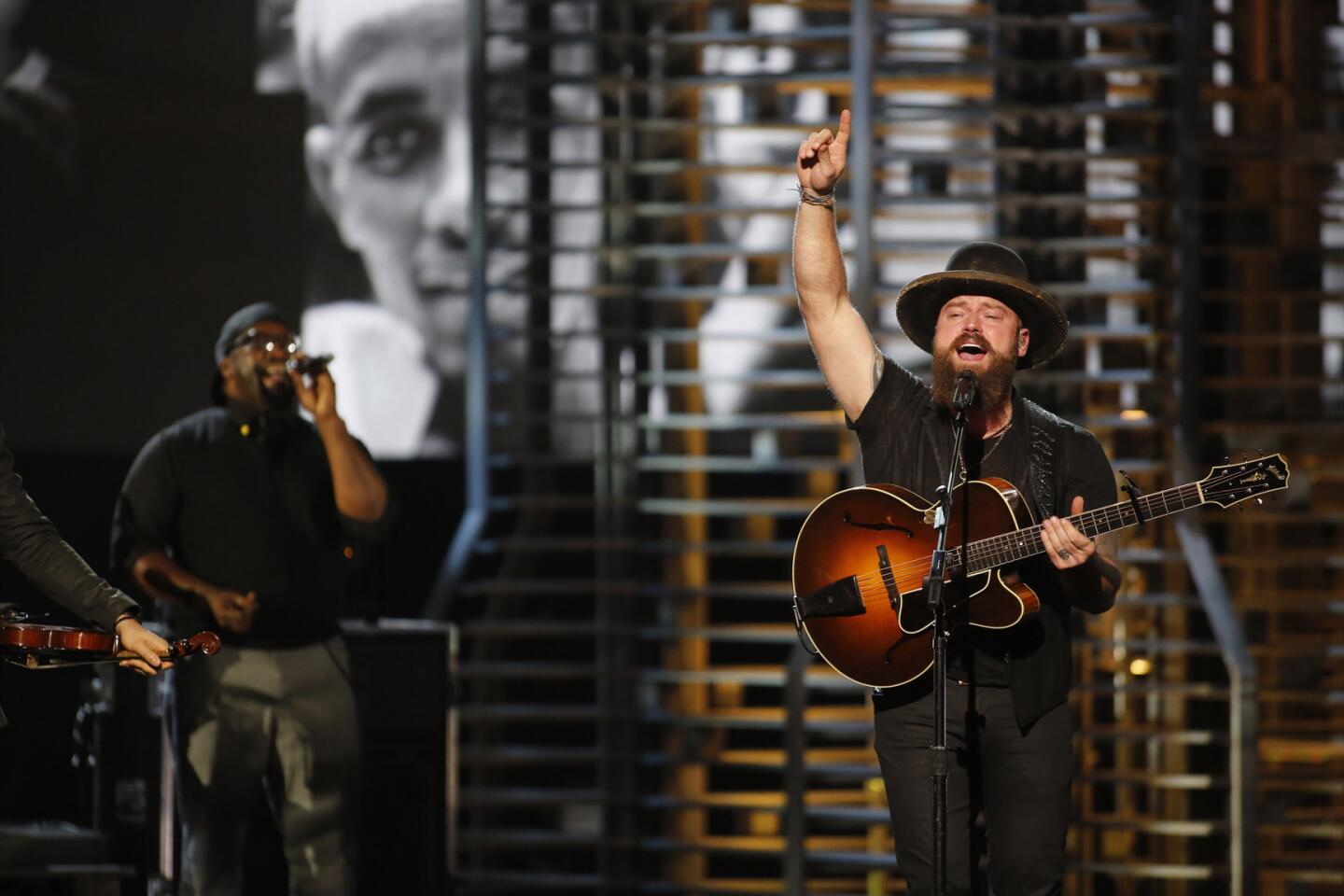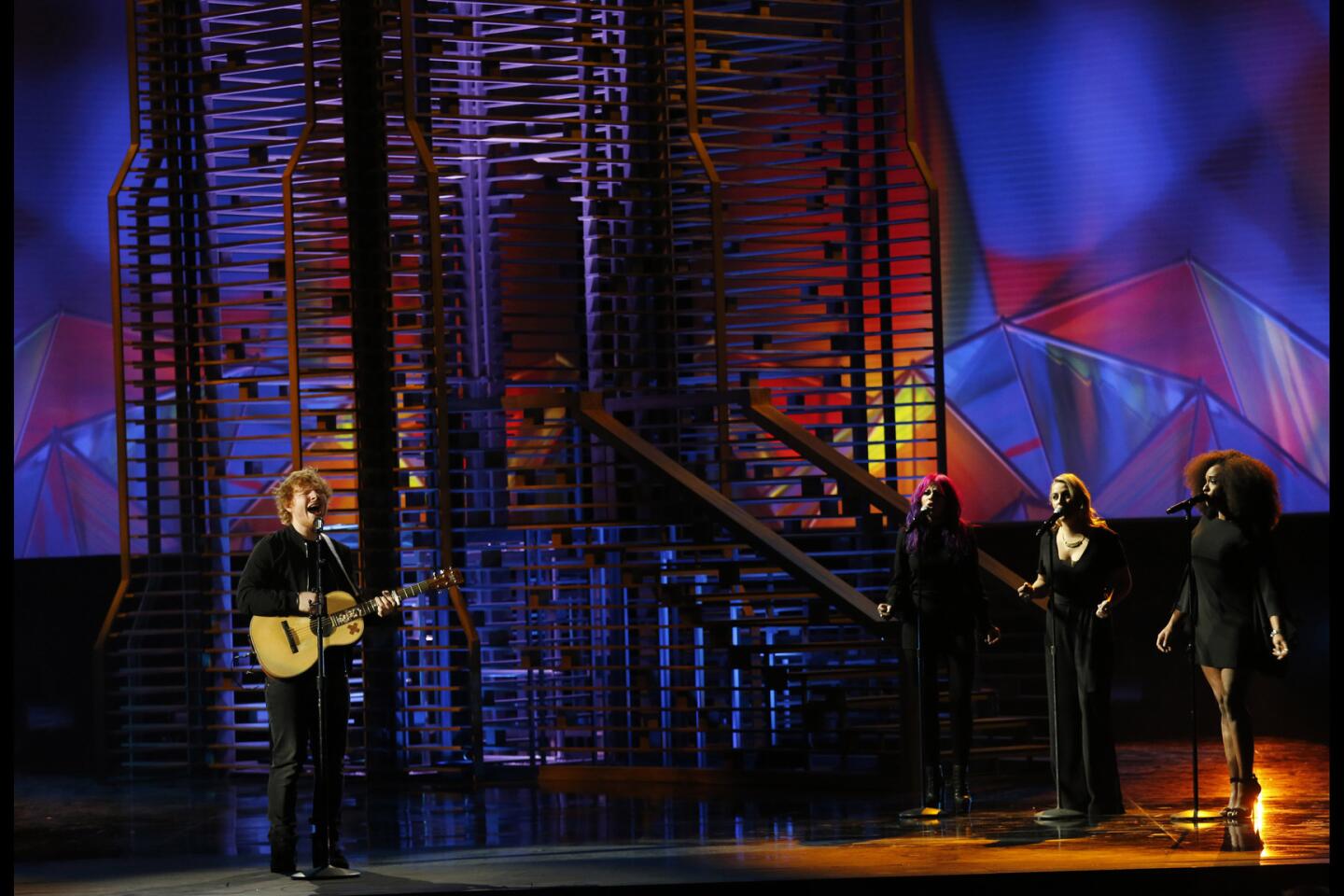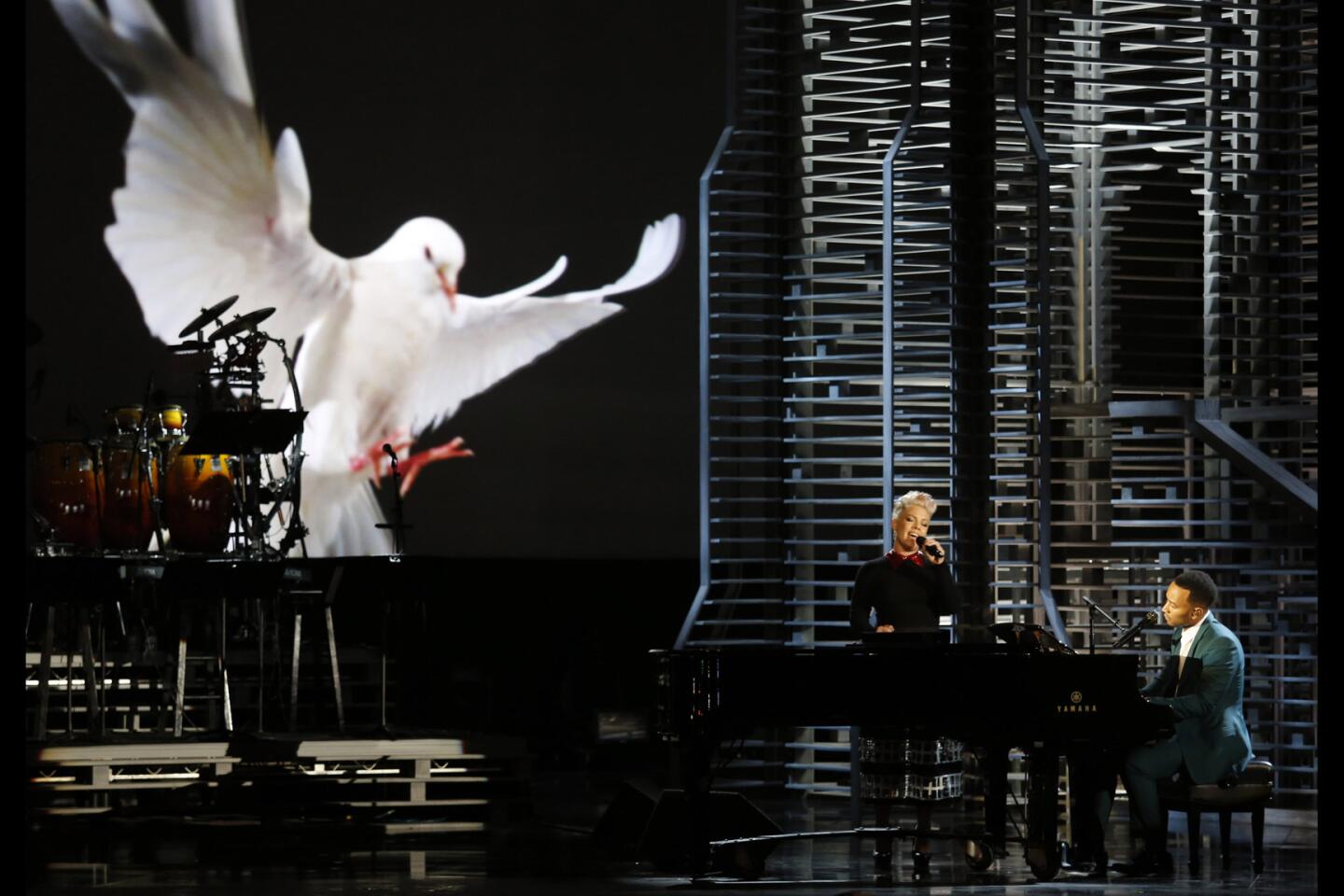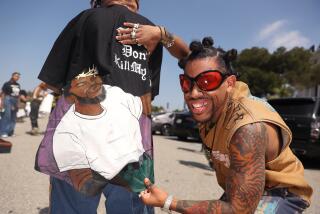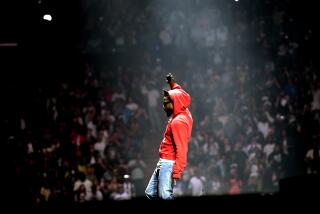No time for ‘Kumbaya’: Musicians tackle racism head-on in ‘Shining a Light’ benefit
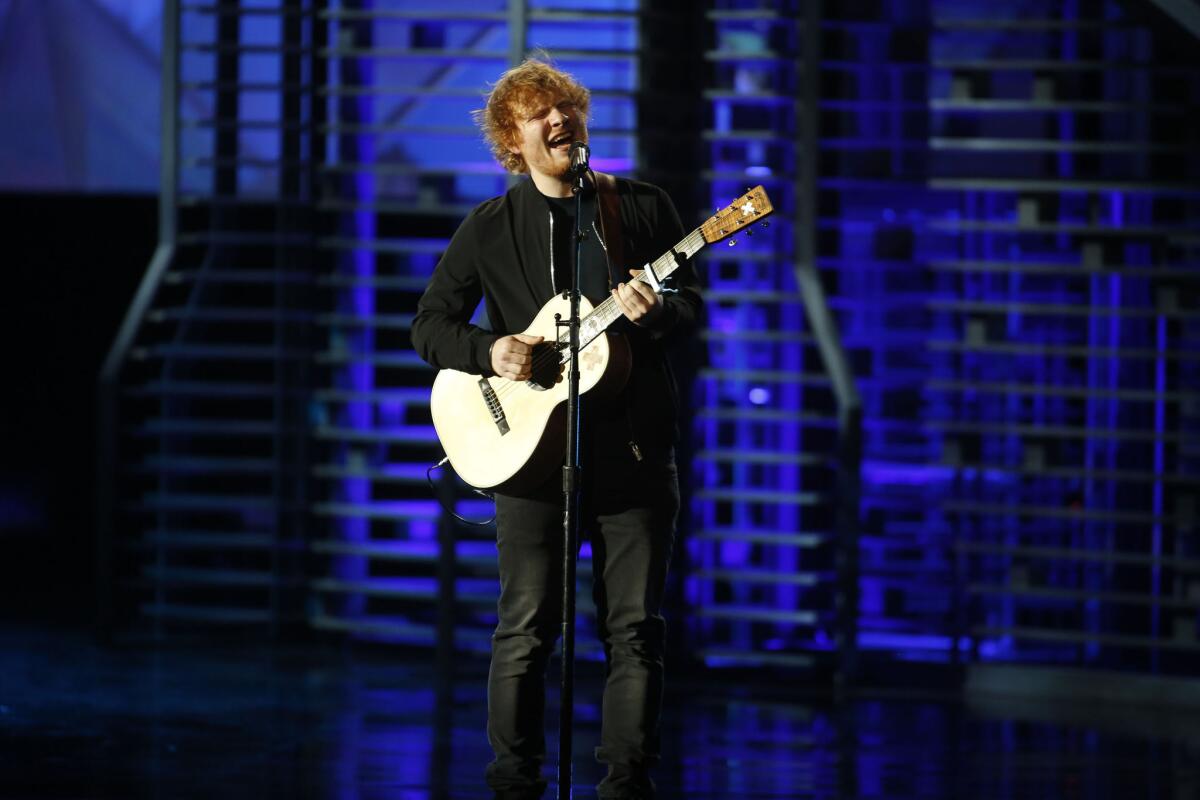
Ed Sheeran performs for the A&E special.
- Share via
The idea wasn’t unusual: Gather a bunch of rock, pop, R&B, country and hip-hop stars for a concert highlighting an important cause — in this case, numerous instances of racial strife across the U.S.
The response from the music community, however, was anything but business as usual.
“I didn’t think quite honestly we could afford another ‘Kumbaya’ moment,” said Grammy-winning songwriter, singer and producer Pharrell Williams about the call he got to participate in a concert for unity. “That’s not where the world is right now. The world needs action.”
SIGN UP for the free Essential Arts & Culture newsletter >>
The push-back by Williams and several of his peers resulted in a concert and TV special that signals an evolution in the long history of pop music benefit concerts — from a star-studded spotlight on a single issue to a serious effort to explore its roots and search for answers.
“I was a little skeptical of the concert,” pop-R&B singer-songwriter John Legend told The Times. “It’s not like artists of different races don’t sing together. We do that at all sorts of events…. It’s not enough just to come together and sing…. For me it was really important to go deeper.”
The sentiments of Williams and Legend were echoed by other participants in back-to-back specials airing Friday night on all six cable channels of A&E Networks: the two-hour “Shining a Light: A Concert for Progress on Race in America,” filmed Wednesday night in Los Angeles, and the hour-long “Shining a Light: Conversations on Race in America.”
Instead of merely bringing leading lights from the pop music world to one stage for a night, organizers and participants in “Shining a Light” also traveled to Charleston, S.C.; Ferguson, Mo.; and Baltimore. They filmed musical performances from epicenters of violent episodes, and then launched public dialogues in those communities aimed at healing wounds and sparking cross-cultural understanding.
The first indication that something different was up at Wednesday’s Los Angeles taping of the concert portion was that the standard all-hands-on-deck number bringing the evening’s heavy-hitter musicians together onstage came not at the endbut at the beginning.
We can promote talking, and then, yeah, when you add the music to that, it becomes something different.
— Pharrell Williams
Bruce Springsteen, joined by Legend and Tom Morello, performed his 2001 song “American Skin (41 Shots),” which he wrote in response to the 1999 death of Guinea immigrant Amadou Diallo, who was killed by police. The choir behind them included most of the evening’s star performers, among them, Williams, Sting, Smokey Robinson, the Zac Brown Band, Pink, Ed Sheeran, Sia, Miguel, Aloe Blacc, Eric Church, Jamie Foxx, Tori Kelly, Jill Scott, Nick Jonas and Big Sean.
Robert Sharenow, executive vice president and general manager of A&E Networks, which will carry Friday’s show on A&E, the History Channel, Lifetime, H2, LMN and FYI, said that the idea for the concert and special was a response to the shooting in June at the historic Emanuel AME Church in Charleston that left nine churchgoers dead.
“There was a universal reaction of horror from all sides of our company,” Sharenow said. “We’re a big media company. We thought, ‘Is there something we can do to raise awareness? To raise money?’”
Shining a Light: A Concert for Progress
Musician-led benefits began in earnest in 1971 with George Harrison’s all-star “Concert for Bangladesh” and has continued over the decades with the Live Aid and Live 8 concerts highlighting strife in Africa as well as concerts after the 9/11 terrorist attacks on the U.S. and benefits after natural disasters such as Hurricane Katrina and Hurricane Sandy.
Musicians, actors and other entertainers often have shifted from advocacy to activism, directly lobbying politicians and other government officials on various political issues. The A&E special brings advocacy artistry and journalism together in a single television program.
“The feeling among the musicians was that ideas that may have worked well in the 1960s and ‘70s aren’t enough today,” said Ken Ehrlich, veteran producer of the annual Grammy Awards telecast who is producing the A&E concert special, which will be broadcast on more than 130 iHeartMedia broadcast radio stations nationwide, and co-producing the conversations companion show.
Added Sharenow, “People didn’t want this to turn into a show where people sing songs, we feel good about ourselves and then go away.”
Ehrlich and other program organizers dispatched teams to Ferguson, Charleston and Baltimore to engage with survivors, family members and friends of victims of violence as well as with members of law enforcement, local governments and other community leaders to initiate what Legend referred to as “difficult conversations” about matters of race in the U.S. in 2015.
“I went to Ferguson, and to St. Louis, to talk to a range of people,” said the 36-year-old native of Springfield, Ohio, who sang Simon & Garfunkel’s “Bridge Over Troubled Water” as part of his visit to Ferguson.
“We met with Michael Brown’s mother, representatives of the young black protesters [at marches in Ferguson after Brown’s shooting death by a Ferguson police officer]. We also spoke to police to get their perspective and to community leaders,” Legend said. “We brought everybody together in a church. It wasn’t supposed to be easy. These are supposed to be difficult conversations. And it did feel uncomfortable. But the conversation was real.”
Alicia Keys engaged in similar discussions with adults and children in Baltimore, and Williams was part of the crew that went to Charleston, where he sang his song “Freedom” in the Emanuel AME Church. After touring the slave quarters on a former plantation, Williams said during his filmed segment that the experience unnerved him.
Those location segments are moderated by journalists Soledad O’Brien (Starfish Media Group), Michele Norris (National Public Radio) and Byron Pitts (ABC News). Actors and other entertainment and sports figures taking part in other aspects of the show include LL Cool J, Morgan Freeman, Nicki Minaj, George Lopez, Mario Lopez, Kurt Warner, Nick Young and Marshall Faulk.
A&E’s promo clip for the program begins “Racism is real … and we need to have a conversation about it.” Onstage Wednesday, Minaj recited Maya Angelou’s poem “Still I Rise” and Freeman quoted South African leader Nelson Mandela’s observation about social and political change: “It always seems impossible, until it’s done.”
Williams, whose upbeat hit “Happy” became a ubiquitous good-time anthem of 2014, said the conversations are intended only as a beginning.
“We can promote talking, and then, yeah, when you add the music to that, it becomes something different,” Williams said. “It becomes a community, a network and musicians all coming together to start the talks.”
Sharenow said the musicians and other “Shining a Light” participants went “above and beyond in terms of what you’d expect from a performer involved in something like this. It’s not a situation where people are showing up in their jets, getting onstage and then rushing off. They are rolling up their sleeves and getting out on the front lines. It’s not a glamorous assignment. It is uncomfortable.”
Morello said the project resonated strongly with him because of instances of racism he experienced first-hand growing up in Harlem.
“I think everyone who has a feeling of moral outrage of this country’s systemic problem of racism should speak out about it in their vocation,” said Morello, guitarist for Rage Against the Machine and his solo project the Nightwatchman. “What we’ve got in music is the combination of rhythm and rhyme and meaning that, when it’s done right, feels like the truth that reaches something deep in our DNA, deep in our reptilian brain and connects people and creates a sense of community. I don’t know that any other art form can do that.”
Still, Morello is realistic about the project’s outcome.
“Racism is as American as baseball and apple pie,” he said. “Will one concert end it? Not likely. But shining a light on racism is an opening to dialogue.”
Follow @RandyLewis2 on Twitter. For classic rock, join us on Facebook
ALSO:
Adele returns to explain the big emotions of your life on ‘25’
Seal is single and ready to mingle at the Ace Hotel
How Justin Bieber turned Staples Center into a megachurch
More to Read
The biggest entertainment stories
Get our big stories about Hollywood, film, television, music, arts, culture and more right in your inbox as soon as they publish.
You may occasionally receive promotional content from the Los Angeles Times.
